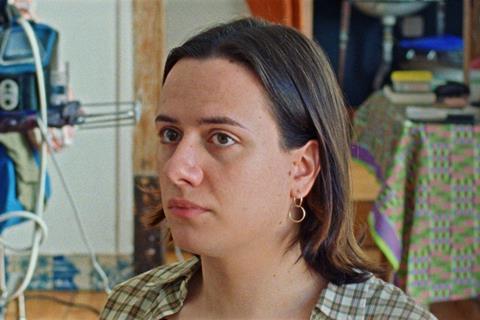Paula Tomás Marques uses a fictional history to shed light on modern filmmaking conventions

Dir: Paula Tomás Marques. Portugal. 2025. 70mins
A project that walks the line between biographical drama and conceptual art piece, the experimental Portuguese LGBTQ+ projectTwo Times João Liberada challenges the conventions of the biopic and takes on the patriarchal structures that still hold sway over much of cinematic storytelling. It is about the making of a misguided film about a fictional historical character, João Liberada, a gender non-conforming shepherdess who was targeted and imprisoned by the Inquisition in 18th century Portugal, and is likely to be of niche appeal.
Challenges the conventions of the biopic
The project is the feature debut from Paula Tomás Marques, who has made several short films exploring gender and sexuality, including 2019’s In Case Of Fire, which won Best Student Short at San Sebastian, and 2024’s Dildotectónica. Two Times João Liberada is a film that was clearly made on a limited budget, and the ambition of a project that involves period details, special effects and a supernatural visitation should be applauded. That said, the picture’s modest production values and unpolished performances will likely limit its reach to audiences who share the film’s prominently displayed politics.
Marques shares the writing duties on the project with June João, the transfemme actress who stars in the film and provides a narration. João, whose character in the film shares the same name, explains that she accepted the role in the film about Liberada despite grave reservations about the project’s approach and, in particular, the film’s director Diogo (André Tecedeiro). It’s a bit of a thankless role for Tecedeiro, who is basically the fall guy and punching bag, representing the evils of cis male entitlement and ignorance.
João finds herself increasingly at odds with Diogo over the direction that the film is taking. And rightly so – for his overuse of hackneyed music choices alone, Diogo deserves a stint in director jail. But João’s main issue is that the film is preoccupied with the tragedy of its subject, dwelling on a soggily-staged suicide sequence. João’s argument is that there is as much to celebrate in Liberada’s radical life as there is to grieve in the manner of its ending. And the ghost of João Liberada, rather shonkily added to several nighttime scenes, apparently agrees with her. The voice of the ghost, distorted and accompanied by glitchy visual interference, speaks to João, waking her from her sleep (“Girl, wake the fuck up!”) to bitch about the project (“Schubert? Really?”).
The argument the picture makes is that any historical biographical representation is essentially untrustworthy because it is viewed through the lens of the author telling the story. In the case of Diogo the director, that means dwelling on the tortured, tragic societal reject aspect of the character. It’s a fair point. But giving Liberada a voice that speaks in modern idioms and chimes with modern political sensibilities is arguably just as much of a perversion.
Production company: Paula Tomás Marques, Cristiana Cruz Forte
International sales: Portugal Film sales@portugalfilm.org
Producers: Paula Tomás Marques, Cristiana Cruz Forte
Screenplay: June João, Paula Tomás Marques
Cinematography: Fresca Malfalda
Production design: Eloísa d’Ascensão
Editing: Jorge Jácome
Music: Maria João Petrucci, Rodrigo Vaiapraia
Main cast: June João, André Tecedeiro, Jenny Larrue, Caio Amado, Eloísa d’Ascensão, Tiago Aires Lêdo, Alice Azevedo
























